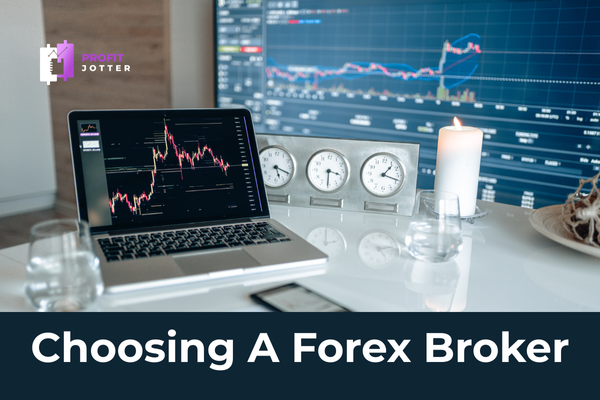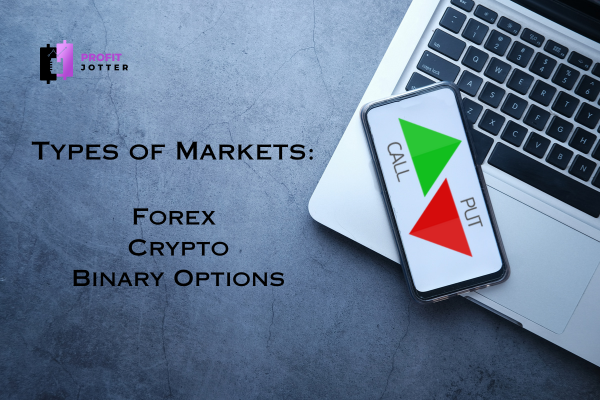Choosing the right Forex broker is very important for anyone looking to get started with Forex trading.
A broker acts as the middleman between you and the market
To help you understand more when it comes to choosing a broker, here’s a beginner-friendly guide to choosing the best Forex broker.
I will highlight the necessary features to look for and also the tools to make a well-informed decision.
But first… What is a Forex Broker?
Forex brokers are companies or platforms that assist with buying and selling foreign currencies.
They provide access to trading platforms where you can trade currency pairs, like EUR/USD, GBP/JPY, and others.
Brokers generally earn money through a commission on a trade or “spread,” which is the difference between the buying and selling prices.
Some brokers also charge fees or offer additional services for more advanced traders.
Some trusted brokers include:
- Exness
- Exco
- IG Group
- OANDA
- Saxo Bank
- CMC Markets
- Forex.com
- Interactive Brokers
- TD Ameritrade
- Swissquote
- Plus500
How to Choose A Broker
A broker is the middleman between you and the market.
So, finding one that is reliable, secure, and meets your trading needs can have a huge impact on your trading experience.
Let’s see how to choose one below.
i. Look for Regulation and Safety
Your top priority should always be safety when choosing a broker.
Regulated brokers are required to follow specific guidelines and laws, making them a safer option.
Regulatory bodies ensure that brokers keep client funds separate from their own operating funds.
By doing so, they are providing protection for the traders in case a broker goes out of business.
Some reputable regulatory authorities to look for include:
- National Futures Association (NFA) and Commodity Futures Trading Commission (CFTC) in the United States
- Financial Conduct Authority (FCA) in the United Kingdom
- Australian Securities and Investments Commission (ASIC) in Australia
- Cyprus Securities and Exchange Commission (CySEC) in Cyprus
Ensure the broker you choose is regulated by one of these bodies or a similar one, as this can provide peace of mind concerning your funds.
ii. Check the Trading Fees and Spreads
Each Forex broker has different fee structures, and this can influence your overall trading costs.
The main costs associated with Forex trading include:
→ Spreads:
Spread is the difference between the buying and selling price of a currency pair.
Brokers that offer lower spreads are preferable, as it means lower trading costs for you.
→ Commission Fees:
Some brokers charge a commission per trade.
This might be a fixed amount or a percentage of the trade value.
Brokers that don’t charge a commission usually make their money from slightly wider spreads.
→ Hidden Fees:
Ensure you are aware of any extra charges, such as inactivity fees, withdrawal fees, or overnight holding costs (also called swap or rollover fees).
Always read the fine print or consult the broker’s website for a breakdown of fees.
iii. Evaluate the Trading Platform
A good trading platform can make all the difference in how you experience Forex trading.
The most popular trading platforms include MetaTrader 4 (MT4), MetaTrader 5 (MT5), and cTrader.
When choosing a broker, check which platform they support and the features available, such as:
→ User Interface: It should be easy to navigate and insightful for beginners.
→ Charting and Analysis Tools: Look for built-in tools for technical analysis and charting, which help analyze market trends and make informed trading decisions.
→ Mobile Compatibility: Many brokers offer mobile versions of their platforms, allowing you to trade on the go. Also, ensure that the mobile version is user-friendly and has essential features for trading.
→ Customer Support: Some brokers have excellent customer service, offering 24/7 support. Check if they offer live chat, email, or phone support and what their response times are like. Such brokers with excellent customer support are the ones to go for.
iv. Consider the Types of Accounts Offered
Brokers usually provide different types of accounts to fit beginner and experienced traders.
As a beginner, you may prefer a standard account with low minimum deposit requirements.
Here are a few common account types to consider.
→ Standard Account: A basic account suitable for most beginners, with lower leverage and simple trading features.
→ Mini or Micro Account: This type of account allows you to trade in smaller lot sizes (usually 1,000 units of currency), making it ideal for beginners who want to start small.
→ VIP or Professional Account: Designed for experienced traders, with additional perks like lower spreads, better analysis tools, and access to a dedicated account manager.
v. Research Leverage Options
Leverage allows you to trade with more money than you have in your account.
This has the potential to increase your profits.
However, it also increases risk, so it is advised to choose a broker that offers suitable leverage options.
For beginners, a broker offering low leverage, like 1:10 or 1:30, is ideal. This sort of leverage reduces potential losses.
More experienced traders may prefer higher leverage options, but they should fully understand the risks associated with it.
vi. Try a Demo Account First
Most brokers offer demo accounts where you can practice trading with virtual money before you begin trading with real funds.
This allows you to fully check out the broker’s platform, understand the trading process, and test your strategies without risking money.
Trading on a demo account also helps you determine if the broker meets your needs and offers the right tools for your trading style.
vii. Educational Resources and Customer Support
A good Forex broker will support beginner traders with educational resources like articles, video tutorials, webinars, and market analysis.
Some brokers even provide personalized support for new traders, and offer guides on basic trading codes to apply to your trade.
Customer support is also vital, especially if you’re new to Forex and have questions or you have technical issues.
Look for brokers with customer service that responds quickly.
Preferably, one that is available 24/7 and accessible through multiple channels such as live chat, email, and phone.
vii. Check for Withdrawal and Deposit Methods
A reliable broker will offer multiple payment methods for both deposits and withdrawals.
Most brokers support bank transfers, credit/debit cards, and popular e-wallets like PayPal, Skrill, and Neteller.
Check out the broker’s policies on withdrawal times and fees to avoid unexpected delays or charges.
viii. Read Reviews and Compare Options
Finally, reading reviews and comparing brokers is an excellent way to see what other traders say about them.
Look for reviews from trusted sources and platforms where traders discuss their real experiences with brokers.
Focus on brokers with positive feedback on issues like transparency, ease of use, and reliability.
- Conclusion
Choosing the right Forex broker is a great determinant of your success as a trader.
You do not need a broker who takes all your profit and leaves you hanging.
Ensure you weigh your options properly and consider different factors like regulation, safety, features, and fees.
Each trader has his needs, so go for whatever matters most to you.
Start with a demo account to get a feel of the platform, and when you’re ready, begin trading with a modest deposit.
GOODLUCK!!!




